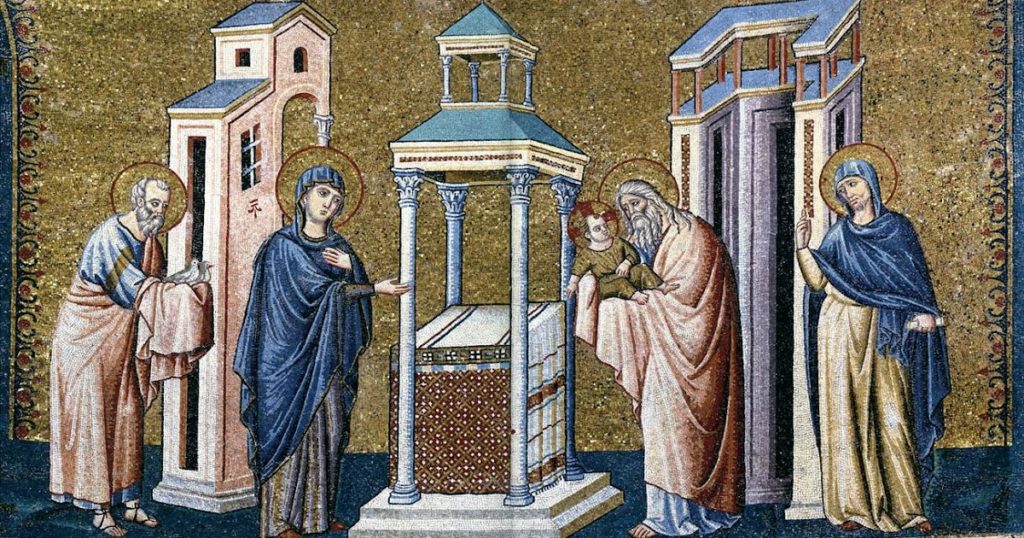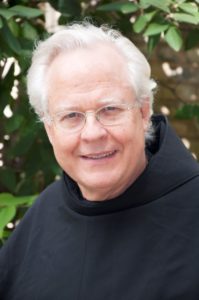
“The Presentation of the Christ Child in the Temple” by Pietro Cavallini, 1295-1300; Basilica of Santa Maria in Trastevere, Rome
On the Feast of the Presentation 2 February 1843, John Henry Newman preached his 15th Oxford University Sermon on the theory of the development of doctrine. He chose Lk 2, 19 and 51 for the biblical text: “Mary pondered all in her heart.” She is the exemplar of reflecting deeply on Scripture. Imagine Mary’s thoughts when Simeon said: “This child is destined for the fall and rise of many…a sign that will be contradicted…and you yourself a sword will pierce.” (See Lk 2:22-40)
Newman retired from active ministry as an Anglican priest in September 1843 to Littlemore where he literally wrote himself into the Catholic Church with An Essay on the Development of Christian Doctrine. Imagine discovering insights into Mary’s heart as a pattern of development! Newman was excited about development and wanted to share his deepest convictions, and state of mind with intimate friends whom he held dearly in faithful friendship. Newman has made a vivid impression in my mind that has lasted for over fifty years. Newman provided a logical value to all of my endeavors, which have had a bearing upon my duties as a Franciscan priest. He provided new light repeatedly. He gave vivid clarity for relatively brief moments even as I knew that the clarity would slowly fade away.
Unexpectedly and resplendently, the metaphor of Newman as a volcanic eruption entered my imagination. I wish I thought of that metaphor, but a dear friend and devotee of Newman shared the moment of discovery. Volcanic eruptions spew lava, releases rock fragments, hot vapors, and gases. Rereading Newman’s Apologia and deliberating new insights excavated the “metaphor of metaphors.” Modernity clothes itself in the useful, the reasonable, and the responsible. Hardly “flat,” his battle against modernity as the great enemy never ceased. His life was as a volcano, an optic with eruptions. His life was a progressive illumination: consistent, visible, and with courage that did not weaken.
In 1825-26, Newman was beginning to prefer intellectual excellence to moral. He was drifting in the direction of the liberalism of the day. A new light on the subject of miracles, the laws of nature sometimes suspended by their Divine Author, became a principle for him with the probability[1] that miraculous intervention would not cease. Bishop Butler’s Analogy of Religion became a lasting influence on his thinking. By 1828, Newman felt modernity based on liberal principles was a cry in the wilderness. He formulated arguments for claiming his principles. The Rationalists failed to comprehend the notion that the world is a sign and sacrament of another world. He strengthened his arguments by studying the period before Nicaea (325) and the great Church of Alexandria, the historical center of teaching at that time, Origen,[2] Dionysius, and others who were the glory of the school. The philosophy of Clement and Origen[3] “carried him away” not the theological doctrine. He found them based on the mystical or sacramental principle. Some portions of their teaching, magnificent in themselves, came like music to his inward ear. Nature was a parable: Scripture was an allegory: pagan literature, philosophy, and mythology, properly understood were but a preparation for the Gospel. The Greek poets and sages were in a certain sense prophets.[4]
At Christmas, 1824, Newman preached about the Pope as Anti-Christ; in 1832-1833 the Church of Rome as bound up by the cause of Anti-Christ by the Council of Trent (1545-1563). Hurrell Froude, his very dear friend, taught him to discard that idea. He taught the real presence and Blessed Virgin Mary. They traveled to Rome, but Froude was ill and returned. Newman repeatedly argued against the Church of Rome while insisting the doctrine of the Old Church must live in Anglican formularies. In 1833 Newman and friends began to write Tracts to remove ambiguities and inform High Churchmen. Did Froude imagine Newman as a Catholic; the greatest English Mariologist by the end of the century?
Newman’s Anglican sermons were mostly on moral matters leading his hearers to the primitive Church but not to the Church of England. He thought there could be an infusion of Catholic truth without damage, meaning, without leading his hearers to the Roman Church. In 1840, he had cogent arguments against Rome while being candid that his preaching did not defend 300 years of the system or religion in the Church of England. The Tracts brought new light, whole evidence, and a bursting of catholicity of the Anglican Church. Newman believed that the Anglican Church teaches the primitive ancient faith as the first principle of all, but in 1840 she was essentially Protestant. The difficulty was: hoisting the engineer on his own petard.[5] By 1839-1841, the Tractarians had caused rumblings that excluded him from the University pulpit. Newman was unquestionably a committed High Church Anglican. Rationalism was the great evil of the day with its Protestant spirit leading to infidelity. Newman had thought: ‘The Church of Rome will be found right after all;’ and then it had vanished. By 1839, his theory that the Anglican Church as the middle way between Protestantism and the Roman Church had been pulverized. He internalized Augustine’s principle: securus iudicat orbis terrarum.[6] The Via Media[7] was a paper mold in which Nations had been cast but was yet to be tried.
In February 1841, Newman published his controversial Tract 90.[8] The Anglican Bishops had objected to Tract 90, but Newman managed to quell the controversy. He had written to a friend about the Tract: ‘Instead of setting before the soul the Holy Trinity, and heaven and hell, the Church of Rome, does seem to me, as a popular system to preach the Blessed Virgin and the saints, and purgatory.’ He felt distress at speaking this, but he thought it, and his bishop told him to express what he thought. Newman recalled Froude: ‘How mistaken we may ourselves be, on many points that are only gradually opening up to us!’ Newman’s criticisms of Rome, he said, were about its political conduct, controversial bearing, and social methods and manifestations. In 1841, Newman was shocked to discover that the Arians were Protestants, semi-Arians Anglicans, and Rome is now what it was then. The Arian heresy had inundated the believing world with: before the Son of God was begotten, He was not. The Son is only a metaphor and the Son is not God, which is the Monophysite heresy. Newman was preparing to translate Athanasius against the Arians with help from the principles and arguments that Newman had been developing. In 1841, the Anglican Bishops stirred up the Tract 90 controversy enough to erupt.
Fr. Edward J. Ondrako, OFM Conv., Univ. of Notre Dame, Remembering Forward #2
_________________________________
[1] J. Butler, Analogy of Religion (1736). Analogies are between the works of God as seen by nature and revelation.
[2] Origen (d.254) is studied as an apologist for the Eastern Church, the Greek speaking world; Augustine (d.430) is the apologist for the Western Church, the Latin world. John C. Cavadini, director of the McGrath Institute of Church Life at the University of Notre Dame, promotes retrieval of apologetics not simply counter arguments but insights from the Fathers, Origen, and Augustine in a new sensibility for the 21st century, a new aesthetic sensibility.
[3] Origen’s influence on Newman includes Contra Celsum. Celsus’ objections against the Christians miss the meaning of Jesus’ form as historical and human, the God-Man. Truth from revelation towers over ancient myths. Origen offers a different sensibility, the power of the divine, the proof of prophecy, the power of Jesus as self-emptying love, and (contra Hume) proof from miracles that point to true vulnerability, love willing to become incarnate to train, to persuade, not to coerce as an earthly king would, but to reveal God’s love. Vatican II took this persuasive turn. Origen stresses primacy of will which became a hallmark of the Franciscan school.
[4] Svaglic, Apologia, 26, 32, and 36.
[5] J. H. Newman, Apologia pro vita sua, 26 May 1864. See M. Svaglic, ed. (Oxford: OUP, 1967), 116-137.
[6] The judgment of the whole world provides its security. See J. H. Newman, Via Media I, 16-17.
[7] Svaglic, Apologia, 111.
[8] On 21 February my reflection is on Tract 90, how it was handled, and the volcanic eruption.
Fr. Edward J. Ondrako, OFM Conventual
Research Fellow Pontifical Faculty of St. Bonaventure, Rome
Visiting Scholar, McGrath Institute for Church Life
University of Notre Dame
February 2, 2022
